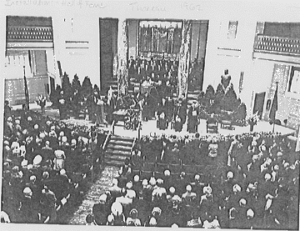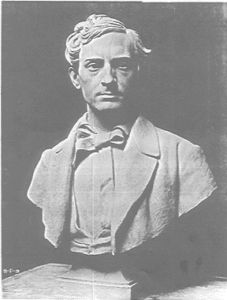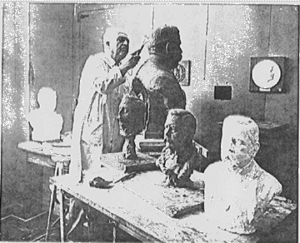Committee Scheming?
On the Hall of Fame ballot for 1955 were the names of 209 candidates, the largest number since 1900.
Pastor Sockman’s letter of June 1, accompanying the ballot to the electors, typifies in some measure the attempts over the years, “not to endorse the opinions of those who have communicated with us but to keep faith with the hundreds . . . who have manifested their interest by communicating with us.” To put it another way, we never tell anyone how to vote; we show how the tide is running. And so, in his first paragraph, Dr.. Sockman says:
“These names were all submitted to a Committee of Twenty One of the Electors, and the ballot indicates the voting of this Committee as well as their first and second choices of candidates worthy of consideration. The voting, as shown, is intended to be suggestive only . . . to concentrate attention not necessarily support.”
Lobbying at the polls? No — suggesting, especially since, “as you will note from the ballot, a great many names do not warrant serious consideration . We respectfully suggest the Dictionary of American Biography for reference purposes.”
Dr. Sockman did warn the electors that even though the university had always tried to be neutral, “letters, books, etc. have been received concerning a number of candidates,” and “in fairness to the great public which has taken the time to send the material,” we should tell you who sent what in whose favor. And, he mentions hundreds of letters for Stonewall Jackson who, a few months later, was elected; and 15,000 signatures for Edward A. MacDowell, subsequently elected.
During his brief tenure as Director in the late 30’s, John Finley had protested that too much influence was brought to bear by this sort of thing and by committee scheming. In spite of representations of neutrality, however, it is not easy for anyone connected with an election process to hold his tongue. On another occasion, years earlier, Chancellor Elmer Ellsworth Brown had suggested to Simon Newcomb’s daughter no more than his hope that Newcomb would be chosen: “I do not try in any way to influence any election.” He merely intimated. To suggest a preference, rather than state it, was good policy even before Machiavelli. Simon Newcomb, astronomer, was elected.
Dr. Sockman himself had once expressed the hope that Francis Asbury would be elected, but hastened to admit that he was prejudiced. As Director, however, he was clean as a hound’s tooth. Bishop Asbury, nine times a candidate, failed of election.
At any rate, in 1955 the Screening Committee of Twenty-One showed greatest preference for Wilbur Wright (18 votes), Stonewall Jackson (17), William James (12), Henry Thoreau (12), George Westinghouse (10), and Andrew Carnegie (10). Of the 209 candidates, only three were elected, all on the Committee’s list: ackson, Wright and Westinghouse. Thoreau, James and Carnegie became members in later elections. Noah dropped to two votes. All of which emphasizes the wisdom of Henry Mitchell MacCracken’s assertion that the discerning and wise electors, encyclopedists all, could, if properly briefed, be a check against the whims of the populace.
Among those who got no votes that year, or ever again, were Edward Stettinius, Secretary of State (1944-5), who conducted the UN Session in San Francisco; and the world-famous John B. Stetson, of the hat and Stetson University. Two more Ivy League founders failed: John Harvard and Ezra Cornell, with no votes, joined Elihu Yale (one vote in 1950) in the outer darkness.
In the tumult of transfer of authority in the seventies much of the Hall of Fame correspondence disappeared and with it the letters endorsing candidates. One can only guess therefore that the John L. Sullivan who was on the ballot in 1955 but got no votes was the Secretary of the Navy during the Truman Administration. Or, as the release from the NYU news office indicated, John (nmi) Sullivan, general in the American Revolution.


Ceremony for Installation of Thoreau


Had the elections been by popular vote the other John L. might have won easily: the super dreadnaught, the great and beloved Boston Strong-boy who, against the law and “in secret,” fought seventy-five red, bareknuckle rounds with Jake Kilrain and put him into retirement with every rib broken. Though he died in poverty with only an old sparring partner named George Bush to take care of him, it was a “Mighty Deed” that John L. Sullivan did that day in 1889 in New Orleans. He may well be our first great and famous sports hero. William Lyon Phelps said he once drank 50 gin fizzes in one sitting. Best justice is done to both Sullivan and the contradictory temper of his times in Vachel Lindsey’s rousing sing-along poem about the New Orleans fight.
